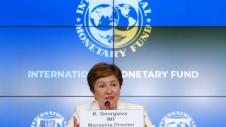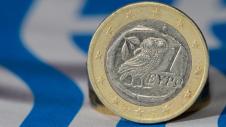The coronavirus is creating six problem areas in Greece's economy, threatening the government's main fiscal targets and to send the economy into a recessionary spiral, as it infects capital markets through to production, investments, and consumption.
Shocks to the economy are growing and forecasts are being revised lower day by day, while gloomy scenarios for GDP foresee losses of up to 2 billion euros for this year. According to analysts, if the coronavirus continues to spread at the same rate in the next two months, the economic downturn will be massive and large scale fiscal stimulus will be needed to help businesses, industries, and workers recover.
The basic areas of risk are:
Growth: According to experts, GDP will shrink from 0.4 to one percentage point, depending on the intensity and duration of the epidemic, which in absolute terms means losses of between 800 million to 2 billion euros. It is estimated that the drop in GDP will mainly come from tourism, which is the driving force of the economy, contributing 11.7 percent or 21.6 billion euros. The other sectors hit hard are restaurants, where turnover has dropped 10 percent, and shipping revenues have also plummeted. It is now assumed that Greece's 2.8 percent growth target is out of reach and that the threshold has now been lowered, at best, to 2.2 percent.
Budget: The economic slowdown has an automatic impact on Greece's primary surplus target as tax revenues drop off amidst lower production, consumption, and income. Additionally, the crisis is putting pressure on public spending, as extra money will be needed to support businesses and sectors affected by the virus. Spending cuts from other areas will be needed to pay for the the support measures as the government pushes back planned tax breaks.
Unemployment and price hikes: Supply chain shortages, due to restricted international trade, are seen reducing output in crucial parts of the economy amidst drops in employment as companies inevitably reduce staff numbers due to lower revenues. At the same time, economists and analysts point out that the virus is also creating supply problems, as businesses reduce production levels due to a lack of workers or supply chain interruptions. Reductions in supply, in turn, feed inflationary pressures. There has already been a sharp rise in prices for certain categories of products in Greece.
Investments: Uncertainty and changing global economic conditions are weighing on investor sentiment, leading them to review decisions with a tendency for risk aversion until the landscape is cleared.
Capital markets: The rise in bond yields poses an obstacle to government plans for a March exit to markets. With the yield on the 10-year bond now moving above 1.5 percent, the cost of borrowing is becoming too expensive.
Upgrades: Fresh upgrades to the Greek economy from credit rating agencies are on hold, which means that this will hurt investor confidence in Greece and government efforts to reduce borrowing costs.









